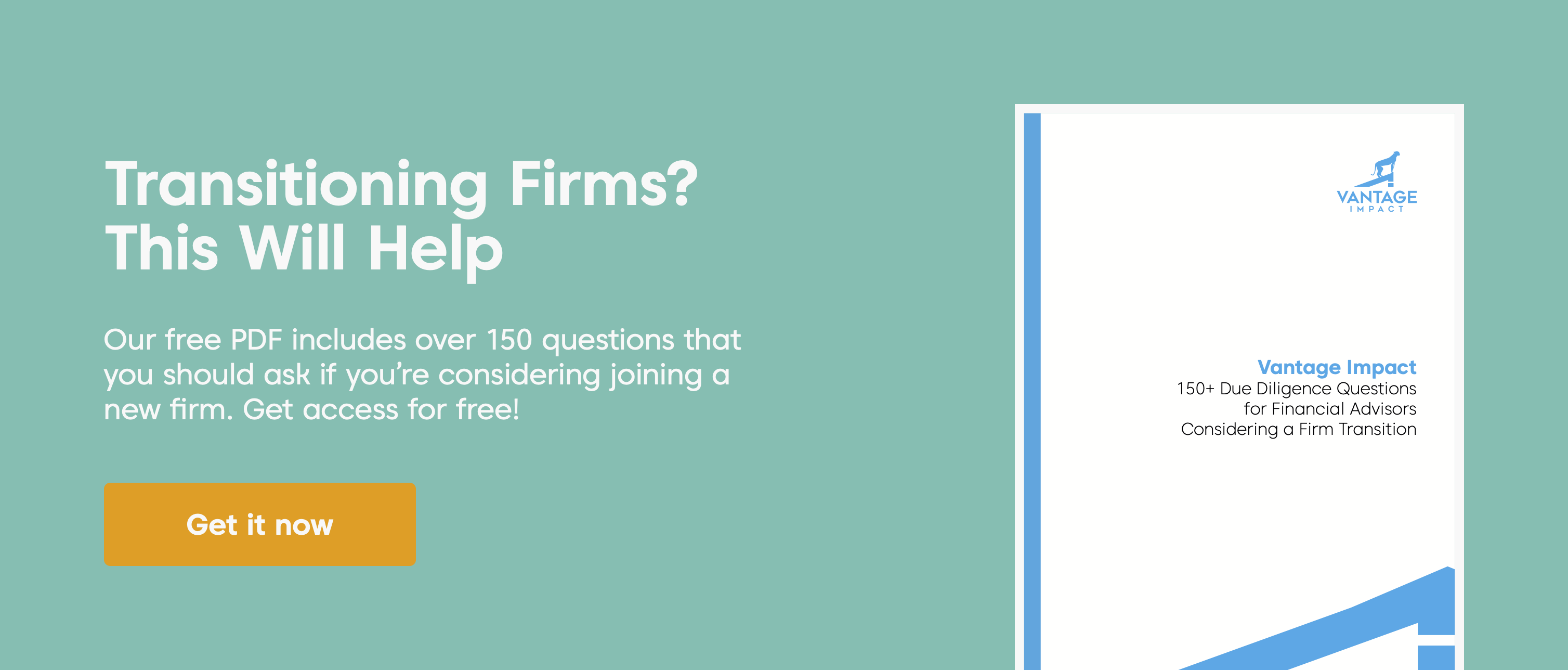
You’re a financial advisor. Has this happened to you?
A phone call comes in asking if you’re willing to talk with a recruiter from a different firm. Before you’ve even had a chance to respond, the recruiter has launched into their sales pitch telling you all about why their firm is the career opportunity of your dreams.
Your blood pressure skyrockets. This is about as fun as sitting in a traffic jam. You don’t have time for this. You’re busy servicing your clients and running a practice.
Most of these calls go nowhere, but one day - that same type of recruiter catches you on the right day, when you’re in the right mood.
You agree to take the meeting, thinking it might be a good thing to explore your options.
Before you go down this road much further, it is important to take a step back and keep a few things in mind. We’ve seen too many advisors get excited about the possibility of a new firm, move way too quickly, and find themselves in a negative situation at the new firm, wondering why they decided to leave in the first place.
1. Thoroughly Review the Expense Structure Details
Advisors often get caught up focusing on what services a firm is offering and end up overlooking the costs of doing business.
As an advisor exploring a W-2 structure, it can be tempting to look solely at the gross take home compensation package, calculated by adding the expected payout rate and compensation from the benefits. Likewise, 1099 structured advisors sometimes emphasize their gross payout rate without sufficiently subtracting all the costs of running a practice to get the true net payout.
The payout rate is only a starting point to gauge your total earnings as an advisor. We recommend advisors request a cost breakdown showing the estimated total expenses broken down into the following three categories:
Non-Controllable Costs: Non-controllable costs are the affiliation costs advisors incur as part of belonging to the firm. These are typically displayed as subscription costs and usually cover technology, errors and omissions, supervision, and marketing.
Controllable Costs: Controllable costs are costs that advisors get to decide whether or not they are incurred. Based on the platform you choose to join, there can be a lot of differentiation. It’s part of the consideration process to decide how lavish of an office you desire, how many staff people are needed based on what support is provided, etc.
Trading and Administration Fees: Firms have different names for these fees, but it all comes down to this question. Does your new firm assess a ticket charge for executing trades and/or is there a basis point fee associated with managed money?
Here is the crucial point: Management fees can drastically vary depending on the firm and break points can result in huge cost savings for large practices. We’re talking hundreds of thousands of dollars in some cases.

2. Upfront Bonus (Loan) - Proceed with Caution!
For many financial advisors, the money a firm offers you as part of a transition package can be one of the largest figures you ever see in your entire career. It looks like life changing money!
It can be life changing, if used strategically as a tremendous opportunity to inject capital into your plans for monetizing and growing your business.
It can also have serious implications for your future and something you need to understand fully before you accept it.
Other than how much of a bonus the firm is offering, here are a few factors to closely consider when evaluating the upfront bonus you’ll be receiving when joining a new firm.
Amortization Schedule: How long is the firm really asking you to remain as an advisor at their company? We see firms issue amortization schedules ranging from 3 to 12 years. The more years offered, the longer they expect you to stay.
Amortization Rate: Don’t assume all firms forgive the bonus or loan the same way or repay the amount in equal installments over the duration of the bonus agreement. After reviewing the total years a firm is offering, look over the rate at which bonus agreements pay down the balance over time.
This is also important for tax purposes. In most cases, advisors recognize these bonuses as income in the year they are earned; therefore, if the earnings vary from year to year then so would the tax liability.
Unexpected Issues: Let’s talk about an uncomfortable topic. What happens if you’re at the new firm for a few years and all of a sudden, something happens? You could be faced with a disability, unexpectedly pass away, develop a terminal illness, or a variety of other life-changing circumstances.
If that happens, are you or your family on the hook to pay back the money? Or are there protections built into your offer/note/bonus agreement to address these unforeseen situations? We typically recommend advisors look out for these stipulations in their offer package. If they are not there, request them! This is an important part of the negotiation process.

3. Develop a Comprehensive Proforma to Compare and Contrast Firms
As you expand your search and collect more and more information from different firms, it can quickly get overwhelming trying to compare, contrast, and synthesize the details.
At this point, many advisors throw up their hands and decide staying at their current firm, even if they’re in a less than ideal situation, is the only option.
Without a standardized way to review firm economics across various platforms, it can feel like you’re comparing apples and oranges.
We recommend advisors follow a structured approach of asking the same set of questions to each firm and inputting the assumptions into a proforma template. This allows you to build a sound understanding of what your actual net earnings will be after accounting for any haircuts, payouts, and non-controllable expenses. This is important so you can evaluate the actual net income for each one of the different firms and options available to you.

It's not easy to go it alone
Moving to a new firm is not like taking a new job in a different industry. There are so many different platforms and options to explore and consider, not to mention the elephant in the room: will your clients transition with you to the new firm?
It’s certainly possible, but it’s not easy.
If you would like to talk about how Vantage Impact can help you evaluate your options, find a new firm, and transition with a built-in marketing and communications agency, set up a consultation here. Our revenue comes from placement fees at our partner firms, so we can do it all at no cost to you.





